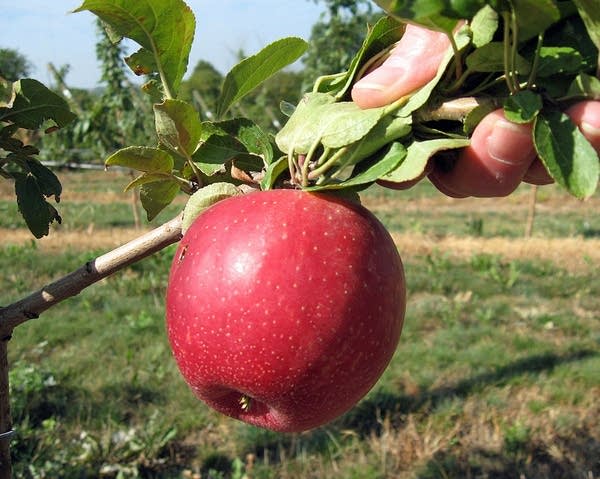Apple growers sue U of M over SweeTango agreement
Go Deeper.
Create an account or log in to save stories.
Like this?
Thanks for liking this story! We have added it to a list of your favorite stories.

More than a dozen Minnesota and Wisconsin apple growers have filed a lawsuit against the University of Minnesota over a licensing agreement to sell the SweeTango apple.
The university created the apple variety and introduced it to the public last year. It quickly became a huge hit at farmers markets and grocery stores around the state.
But as part of SweeTango's launch, the University of Minnesota gave Pepin Heights Orchard in Lake City, Minn., the exclusive right to sell to the wholesalers that put the apple in grocery stores.
While other orchards can also grow and sell the SweeTango, they can only sell the apples at farmers markets, road-side stands or through direct store delivery, according to the lawsuit filed in Hennepin County District Court.
Turn Up Your Support
MPR News helps you turn down the noise and build shared understanding. Turn up your support for this public resource and keep trusted journalism accessible to all.
"The exclusive license agreement eviscerated any right to sell and distribute SweeTango directly to wholesalers, which is an essential revenue outlet for Minnesota apple growers and the Minnesota apple industry," the growers said in the lawsuit.
University of Minnesota officials said they were still reviewing the lawsuit and declined to comment on the specific claims the apple growers are making.
But university spokesman Dan Wolter said the licensing agreement with Pepin Heights Orchard was designed to protect the quality of the SweeTango apple while maximizing the revenues the university would bring in from the apple.
The agreement has been used on other products the university has developed over the years, but it's the first time the university worked with a single orchard when introducing a new apple variety.
"We're doing it in a different way, and for us that's part of the new financial reality of funding research," Wolter said. "I think we also have an obligation to taxpayers to ensure that the quality of the SweeTango line is protected and preserved so it continues to be a solid revenue-producing apple."
The lawsuit seeks to nullify the licensing agreement, arguing that it violates state anti-trust laws and promotes unfair competition. The lawsuit also seeks monetary damages.
Lisa Lamm Bachman, the attorney representing the apple growers, said some of the growers have lost accounts with certain wholesalers because they're not able to meet demand for the SweeTango apple.
"They're not able to supply a wide variety of apples," she said.
Pepin Heights Orchard and several Pepin and University of Minnesota officials are also named in the suit.
Dear reader,
Your voice matters. And we want to hear it.
Will you help shape the future of Minnesota Public Radio by taking our short Listener Survey?
It only takes a few minutes, and your input helps us serve you better—whether it’s news, culture, or the conversations that matter most to Minnesotans.




